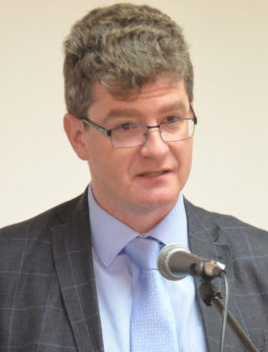Though stressing that the UK government is committed to supporting Guy-ana’s security sector, British High Commission-er to Guyana Greg Quinn on Friday said that a decision is yet to be made regarding the continuation of the work started by fired British advisor Dr. Sam Sittlington at the Special Organised Crime Unit (SOCU).
“There is an ongoing review back in the UK about what the nature of our support to SOCU might be going forward… we are looking at what might happen for the next calendar year and so that review hasn’t concluded. So it is a little bit early for us to know for sure what we might be doing with SOCU going forward,” he told reporters on Friday.
On January 31st, the UK terminated the contract that Sittlington had with the unit on the same day this newspaper reported that he had registered a local branch of his company even while still advising SOCU on training and a range of other matters.
Sittlington, a former police investigator, arrived in Guyana in early 2016 and had been working continuously with SOCU since then to strengthen the unit’s operational capacity, with a view to increasing the effectiveness of the country’s ability to tackle money laundering, terrorist financing and other serious crimes.
Public Security Minister Khemraj Ramjattan had expressed satisfaction with Sittlington’s work and is interested in having him continue the work started.
Asked if he felt there was anything that needed to be reviewed going forward, Quinn said that one of the things that would have to be look at now is the “nature of some of the allegations that have come out about SOCU, especially most recently.”
In an exclusive interview with this newspaper, Sittlington, who denied any conflict of interest in him setting up a local branch of his company, had claimed that documents concerning the company were leaked to divert attention from the controversy surrounding former forensic analyst Sheronie James and the problems at the unit. He claimed that the unit’s head, Sydney James, advised him how to set up the company and allowed him to use his Lamaha Springs home address for the registration. James has since denied this.
Sittlington has told this newspaper that there was grave mismanagement taking place at the unit and some of this was corroborated by staff.
The concerns include the spending of operational funds, which ought to cater for basic things, such as the purchase of toiletries and credit for investigators and other staff, as well as the current arrangement for the storage of seized cash.
Sittlington had told this newspaper that tensions arose between him and Sydney James, a former army intelligence officer, when he began to question the spending of funds set aside for the operation of the unit and requested “certain information” late last year.
Following a meeting between Commissioner of Police Leslie James and the SOCU head, an audit was ordered. The Guyana Police Force’s audit department met with SOCU’s head and based on a request, certain documents including receipts for items bought for the office, were to be submitted as part of an audit. Those were submitted several days later, this newspaper was told.
Ramjattan said on March 9th that the audit was moving apace and that Sydney James was questioned by the auditors. Ramjattan dismissed suggestions that the auditors should have been from an independent agency given that the unit falls under the Guyana Police Force and that James should be off the job until the audit investigation is complete.
According to Quinn, the UK government’s commitment to supporting the security sector “more broadly” is still there but “we need to make sure that the support we are providing is the right sort of support in the right place at the right time.”
Asked about SOCU’s work, he said that while there was progress being made, it must be understood that the unit was handling complicated matters.
“These cases are always slow… there are complicated cases, it’s not an easy case to try because the whole point is that you’ve got to make sure you’re a hundred percent sure before you go to court and I know lots of people are requesting — ‘…we need convictions, we need prosecutions’ — but you know you’ve got to make sure you’re confident about the strength of the case before you go to the prosecution. So actually sometimes it’s better to wait until you get to that stage rather than rush into something and maybe lose,” he said.
In addition to the approximately 25 forensic audits referred to it since 2015, the unit also had to do its regular work, which includes money laundering and other types of criminal investigations.
Sources have said that the unit has insufficient manpower to effectively tackle this large volume of work and this has resulted in few cases being taken to court.
In addition to the unit’s head there are two forensic analysts, one intelligence officer, nine investigators and a lawyer.
SOCU was set up in 2014 by the then PPP/C government to deal primarily with investigating suspected cases of money laundering and the financing of terrorism. Based on subsequent amendments to its governing legislation, the unit is now mandated to collect, investigate, gather and use forensic and other evidence of cases related to money laundering/terrorist financing and other criminal activities.
The criminal activities outside of terrorism and money laundering which are outlined in the amendments are: participation in an organised criminal group and racketeering; trafficking in human beings and migrant smuggling; sexual exploitation, including the sexual exploitation of children; illicit trafficking in narcotic drugs and psychotropic substances; illicit arms and ammunition trafficking; corruption and bribery; fraud; counterfeiting and piracy of products; environmental crimes; murder; grievous bodily harm; kidnapping, illegal restraint and hostage taking; robbery or theft; smuggling; extortion; forgery; piracy; insider trading and market manipulation; tax evasion; and gold smuggling.





